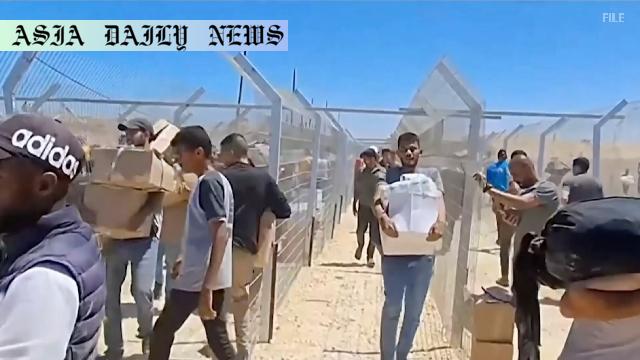Food aid disruption: Gaza foundation halts operations amid attacks, calling for efficiency improvements, sparking global critique.
Food aid distribution in Gaza paused by US-backed group.
Israeli forces blamed for violence at aid sites.
UN criticizes move, urges investigation and UN leadership.

Food Aid Halt Fuels Tension in Gaza
The decision of the Gaza Humanitarian Foundation to suspend food aid distribution on Wednesday sent shockwaves through an already fragile region facing humanitarian challenges. The foundation, a US-backed organization, stated that the temporary halt was necessary to conduct maintenance work aimed at “improving efficiency”—a claim met with widespread skepticism as attacks on civilians continue. The humanitarian crisis in Gaza has escalated with the ongoing conflict, and this interruption further destabilizes vulnerable communities in desperate need of support.
Conflict Intensifies as Civilians Face Harsh Realities
Local authorities reported that civilians waiting for food aid have been subjected to gunfire by Israeli forces near the distribution centers, resulting in casualties including deaths and injuries. As roads leading to distribution centers are blocked, families stranded amidst violence find their access to essential resources cut off. The Israeli military has amplified this difficulty by controlling routes to the sites. This intensification leaves many questioning who truly bears the brunt of these disruptions—ordinary people whose only crime is attempting to feed their families.
Global Pushback Against the Food Aid Suspension
The United Nations, along with other international organizations, has vocally condemned the suspension. Stephane Dujarric, spokesperson for the UN, deemed the developments “unacceptable,” emphasizing how life-threatening it has become for civilians attempting to access basic nutrition. He called for an independent inquiry and urged a UN-led framework for food aid distribution to ensure impartiality. The criticism underscores the urgency of balancing humanitarian considerations over political or operational concerns in the region.
The Role of International Actors in Gaza’s Crisis
This unfolding situation points to significant challenges faced by international actors attempting to aid Gaza. The foundation’s decision raises larger questions about the feasibility of aid distribution under the looming specter of violence. Where humanitarian work should signify hope and recovery, external political influences have instead stymied progress, drawing focus on the need for transparent operations. The call for adherence to a UN-led framework reflects these frustrations and highlights a need for a globally united response.
Looking Ahead: Implications for Gazan Civilians
The halt and subsequent debates surrounding food aid distribution paint a dire picture for Gaza’s civilians. The population suffers doubly from the violence inflicted by military forces and the institutional hurdles blocking aid delivery. Resuming food distribution on Thursday may promise some relief, but broader structural reforms and a commitment to respect humanitarian law remain crucial. Without these, the cycle of violence and deprivation risks perpetuating indefinitely.



Commentary
Global Responsibility Amid Crisis in Gaza
The disruption of food aid distribution in Gaza underscores a profoundly difficult situation that raises both moral and operational concerns for the international community. The fact that civilians have to face gunfire just to secure meals reflects a heartbreaking reality that testifies to the depths of humanitarian need in the enclave. It is incumbent upon global powers to reassess how they approach such crises and ensure life-saving resources reach those in need, even amid conflict.
The Ethical Dilemmas for Humanitarian Organizations
While the Gaza Humanitarian Foundation claims efficiency improvements as its rationale for pausing operations, such decisions must be evaluated with a critical lens. For organizations tasked with providing relief, prioritizing technical upgrades should not come at the expense of service continuity in dire times. The suspension reflects broader ethical dilemmas humanitarian bodies face when navigating complex geopolitical environments, underscoring the perils of tying aid efforts to political backing.
Call for Transparent, UN-Led Coordination
Calls from the UN for a centralized and impartial framework for food aid distribution highlight the importance of an independent process in regions rife with conflict. Allowing the UN to take the lead ensures that programs are shielded from political influence, helping better serve those most in need. The fact that such measures have yet to be implemented in Gaza reveals a stark gap in global governance and cooperation during crises. It is this area where the international community must focus its resources and efforts moving forward.
A Responsibility to Protect Civilians
Ultimately, the well-being of civilians in Gaza must remain central. Humanitarian aid is not a choice but a responsibility, emphasizing humanity over politics. The onus lies on all parties—both local actors and international players—to ensure that the dire needs of residents are met. Until this responsibility is upheld, incidents like this week’s food distribution halt will continue to mark broader failures in prioritizing human lives during conflict.